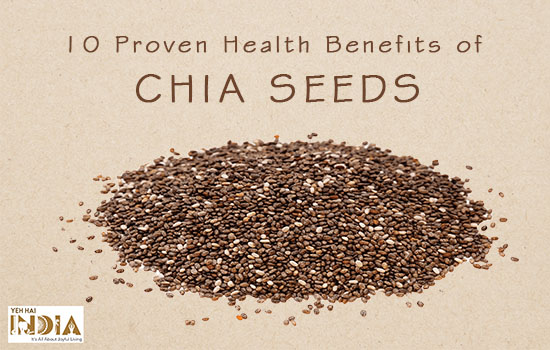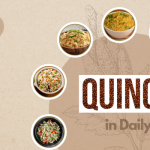Chia seeds are praised for their slightly sweet flavour and incredible nutritional abilities and can be added to almost any dish of your choice, from smoothies to salads. Chia seeds have been linked to numerous health benefits, including improved digestion, weight loss, and a lower risk of heart disease. Even though many of us may not have used it in our daily diets, it should be familiar to anyone who pays even passing attention to healthy food.
For good reasons, this previously unnoticed food item has swiftly attracted a lot of attention. It is currently receiving a lot of attention as a mainstay superfood. These seeds pack a powerful nutritional punch in a small package. Let us reassure you that chia seeds are well worth the hype.
Chia seeds are recognised in India as a superfood. The seed oil has been recognised by the Indian Council of Medical Research and the National Institute of Nutrition and has been deemed a ‘robust oil’, a strong and healthy oil, as it is one of the nutritious edible oils with a balanced source of saturated, monounsaturated, and polyunsaturated fatty acids. According to nutrition experts, chia seeds are a powerhouse of essential nutrients.
But what are chia seeds? Why are they good for our bodies? How can we make them a part of our diets? Here is everything you need to know about these seeds.
What are chia seeds?
Chia seeds, as their name implies, are tiny, round “seeds” that can be black, white, or brown in hue. It comes from the flowering plant Salvia hispanica, a member of the mint family. It is a crop that can be sustained and requires minimal water to thrive.
These super seeds are surprisingly simple to absorb. This adaptable quality lets them absorb liquids up to 12 times their weight. They create a gel around themselves when combined with liquid, which gives the mixture its distinctly unique texture. These are tiny but powerful elements that can transform any ordinary dish into a balanced, nutritious meal.
Chia seeds are an important part of a runner’s diet because they provide energy for runners and soldiers who engage in long-distance running or prolonged combat. They are said to have the ability to cleanse the blood and enhance digestion, as per Ayurveda.
Naturally, chia seeds have several health benefits. Regular consumption helps to support healthy skin, stronger bones, and a reduction in the visible signs of ageing. Further, it promotes renal function and provides the highest level of hydration. You can always rely on a chia seed recipe to give you a surge of energy because the word “chia” literally means “strength” in Mayan.
Recommended article – 6 Edible Seeds With Great Health Benefits
Chia Seeds – Nutrition Value
Chia seeds are an absolute powerhouse of nutrients as they exceed the dietary fibre content compared to cereals, dried fruits or nuts. They have a high content of alpha-linolenic acid and have omega 3 more than flax seeds.
Chia seeds are also a good source of protein and are rich in niacin while having six times more calcium, eleven times more phosphorous and four times more potassium than milk. Also, chia seeds contain plentiful phytochemicals as well as antioxidants.
Let’s have a look at the chia seeds’ nutritional value from a single serving. One serving of dried chia seeds can thus include about 137 calories, 5 grams of protein, 10 grams of fibre, 12 grams of carbohydrates, and 9 grams of fat, of which 8 grams are heart-healthy fats.
Health Benefits of Chia Seeds
Chia seeds offer a wealth of health benefits since they are nutrient-dense. According to specialists, chia seeds are considered to be a functional food which, in their changed or unchanged form provides an ample amount of health benefits.
Continue reading to learn in detail the top 10 health benefits of chia seeds and why you should start including them in your diet right away.
1. Promotes healthy digestion
Chia seeds can meet up to 44% of your daily fibre needs and can hold water 12 times their weight. This water-absorbing capacity is the wonder factor why there is an improvement in digestion and gut health. It acts as a prebiotic by feeding the good bacteria in the gut which contributes to the increased bioavailability of minerals as well as improved intestinal function.
Apart from this, it also helps you feel full for a long time by absorbing the proper amount of water and thus assists in breaking any excessive eating habits.
2. Builds stamina and improves performance
Chia seeds are well known for being an ideal snack for athletes. Studies have revealed that chia eating improves exercise performance and workouts more so than the use of sports beverages.
Due to their structure, chia seeds increase energy levels while lowering fluid loss and it doesn’t contain extra sugar, preservatives, or tastes, which unsurprisingly makes them a potent ingredient in energy drinks.
Chia seeds are high in protein, which aids the body in gaining strength and muscle building. Studies show chia seeds to be a good post-workout food because they support the repair of muscle tissues and significantly speed up muscle recovery.
3. Helps manage body weight
Chia seeds naturally contain a lot of protein, which helps to build leaner, stronger muscles and to burn fat while controlling hunger and appetite. They reduce food cravings as it lowers ghrelin levels that stimulate hunger and inhibit adipogenesis*. Research has indicated that consuming more chia seeds can boost weight loss. The best part is that chia seeds for weight loss work since they decrease appetite while keeping the body’s energy levels stable.
*Adipogenesis is the process by which adipocytes or the fat-laden cells, develop and accumulate as adipose tissue.
4. Maintains healthy vision
Just one of the many varieties of seeds that help enhance vision is chia, due to its abundant supply of vitamin E. Vitamin E can aid in the prevention of macular degeneration and cataracts, or at the very least, halt their advancement. Moreover, they contain more omega-3 fatty acids than flax seeds or salmon, as well as more calcium and antioxidants than blueberries and milk.
Recommended article – Top Herbal Teas in India
5. Regulates blood sugar
Chia seeds can actively aid in controlling the body’s blood sugar levels by decreasing post-prandial glycemia*. Studies have found that chia seeds aid in the control of normal blood sugar levels due to the high content of fibre and alpha-linolenic acid. In addition, it aids in the battle against type-2 diabetes.
*post-prandial glycemia is the blood sugar levels after a meal.
6. Improves heart health
Chia seeds are incredibly high in fibre, antioxidants, and heart-healthy lipids like omega-3. This is what makes them so excellent for the health of our hearts. These wonder seeds have a scavenging effect which provides antioxidant protection as well as phenolic components such as quercetin and myricetin that have a cardio-protective effect.
7. Promotes dental hygiene
Calcium, phosphorus, zinc, and vitamin A are all abundant in chia seeds, which contribute to the general improvement of dental and oral health. Zinc aids in the mineralization of teeth brought on by plaque and in preventing the formation of tartar. It also has a lot of antimicrobial properties that aid in preventing foul breath. Calcium, the main component of a tooth, contributes to maintaining the general health of teeth.
8. Beneficial to bone health
Chia seeds are loaded with large amounts of nutrients that support bone health and help increase bone density and bone strength. They provide nourishment for the bones since they contain large amounts of calcium and manganese. This is so because calcium is crucial for maintaining bone density and strength.
Further, manganese also has a crucial role in bone metabolism. It is a remarkable fact that just one ounce of chia seeds can provide our body’s requirements for 30 per cent of manganese and 18 per cent of calcium.
9. Helps in maintaining healthy and glowing skin
Antioxidants found in chia seeds are remarkably abundant and effectively combat free radicals. This prevents oxidative stress and any skin damage brought on by dangerous free radicals. More, it encourages quicker tissue recovery, safeguards against any potential skin injury, as well as offers protection against ageing-related enzymes by preventing degradation of the protein matrix on the skin.
10. Fatty Liver
Fatty liver has become one of the most common diagnoses even among young adults, but chia seeds have got that covered too. Studies show that there was a reduction in the intrahepatic (liver) fat due to the beneficial effects of omega 3, dietary fibre and polyphenols present in the seeds.
How to eat chia seeds?
Chia seeds also have the notable advantage of being quite simple to add to our everyday diet. Their flavour is unique but not overpowering, tasting almost exactly like poppy seeds. Also, they can give your food a fantastic texture. They do not need to be cooked first and are a useful addition to practically all of your recipes.
Consume them uncooked or simply sprinkle them on your sweets, rice, yoghurt, veggies, smoothies, cereal, or even juices; they’ll mix in without overpowering the flavour. And, because of their rich gel-like texture when soaked in warm water, chia seeds can be used in recipes in place of eggs to improve the consistency of sauces.
No matter which variety you choose—black, white, milled, pre-hydrated, or dried— all types of chia seeds are quite simple to include in a regular diet. Regardless, preferring to include dried chia in recipes is the simplest way to utilize its health-benefitting properties. It is, however, crucial to choose organic chia seeds no matter what variety you choose.
All you need to know is which chia seeds recipes are the most efficient after you know what to choose from the grocery store aisles. Chia seeds must be used in moderation, just like any other food item. Because of their high fibre content, excess consumption may cause adverse effects including stomach discomfort if they are consumed in excess, although these effects can typically be avoided by drinking lots of water. Also, it is advisable to avoid chia seeds for people who are prone to kidney stones.
It’s time to get these miraculous tiny nutrient bombs in our kitchen and incorporate them in our salads, sabzis, mixed seed laddoos or chikkis.
Include these super nutritious seeds in your daily diet and make the most of their delicious flavour.
Also, Read – Sowing the Seeds to a healthier lifestyle – Adopting a Plant-based Diet
Frequently Asked Questions:
1. What are chia seeds?
Chia seeds are small black or white seeds packed with a ton of nutrients. They are high in fibre, protein, omega-3 fatty acids, and various other vitamins and minerals. Chia seeds have been linked to numerous health benefits, including improved digestion, weight loss, and a lower risk of heart disease.
2. How do you eat chia seeds?
Chia seeds can be eaten raw or soaked in water or other liquids to form a gel-like substance. They can be sprinkled on top of yoghurt, oatmeal, or smoothies, or used as an egg substitute in baking. You can also add chia seeds to salads, soups, or sauces for added texture and nutrition.
3. How much chia seeds should you eat in a day?
The recommended quantity to consume is 1-2 tablespoons of chia seeds per day. This amount provides a good balance of fibre, protein, and healthy fats without overloading calories.
4. Are chia seeds safe to eat?
Yes, chia seeds are safe to eat for most people. However, it is important to drink plenty of water when consuming chia seeds, as they can absorb up to 12 times their weight in water. This may cause digestive issues if not hydrated properly.
5. Can chia seeds help with weight loss?
Chia seeds are a popular weight loss aid due to their high fibre and protein content. This can help reduce appetite and promote feelings of fullness. However, only more research can determine the extent of chia seeds’ weight loss benefits. Incorporating chia seeds into a balanced diet and exercise routine may help support healthy weight management.










